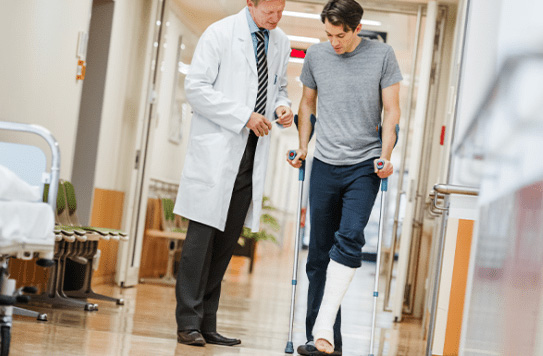




PIP Covers Your Medical Bills: In a car accident, your insurance policy covers your medical bills first. We’ll explain how the system works and what to do when it doesn’t.
When you’re navigating the complex world of auto insurance, especially in no-fault states like New Jersey, PIP is one of the most important concepts you’ll encounter. Making the wrong choices about your PIP insurance could cost you big-time, possibly hundreds of thousands of dollars, in the event of an accident.
What is this insurance coverage? Why do you need it? And what obligations does PIP insurance put on you if you have an accident?
PIP stands for Personal Injury Protection. This is a type of insurance coverage included in all auto insurance policies sold in New Jersey.
PIP is the portion of your insurance coverage that relates to injuries to the policyholder.
The reason why PIP exists is that NJ is a no-fault state. When someone gets hurt in an accident, that person’s own auto insurance company is the one responsible for paying the medical bills.
No-fault laws have benefits. In a no-fault state, you can get the medical care you need immediately after a collision. You don’t have to wait around for the insurance companies to figure out who is at fault.
However, no-fault laws also have drawbacks. It may seem unfair that your insurer is the one paying the bills for an accident you didn’t cause. You will also have to pay toward your medical care until you meet your out-of-pocket maximum.
PIP doesn’t cover injuries that other people may sustain in a collision that you cause. A different type of coverage, called bodily injury, does this.
PIP also doesn’t cover damage to your car. The property damage portion of your auto insurance, or the other driver’s insurance, is responsible for this cost. PIP covers only your personal injuries—that is, the injuries you sustain to your person—and certain financial losses related to those injuries.
 PIP primarily covers the cost of your medical treatment that results from an accident. The medical expenses PIP covers include:
PIP primarily covers the cost of your medical treatment that results from an accident. The medical expenses PIP covers include:
You can also purchase additional PIP benefits with your policy. This coverage is optional, so you might not have these benefits if you opted for the plan with the cheapest premiums.
Most drivers with a standard (not basic) auto insurance plan do purchase the extra PIP package, according to the New Jersey auto insurance buyer’s guide. However, some drivers decline the extra PIP package completely. Others choose the cheapest option of extra PIP coverage and get stuck with very little of this additional coverage.
The benefits available if you purchase the extra PIP package coverage include:
Income continuation is coverage for the wages you lose while your injury prevents you from working. The basic extra PIP package that comes with most policies provides for up to $100 per week. You might be eligible for more substantial benefits if you purchased additional coverage.
If you chose to decline income continuation benefits entirely, filing a car accident lawsuit is one of your only options for recouping lost wages. A lawsuit may also be your only option for recovering the full amount of wages you have missed out on, particularly if you remain disabled for longer than you were able to collect benefits.
Essential services include any tasks, like housekeeping, lawn maintenance, and laundry, that you normally do yourself but can’t do because of your injuries. Generally, you can receive up to $12 per day of benefits covering essential services. Again, it depends on your insurance coverage selections.
The death benefit allows the surviving family or the estate to receive income continuation or essential services benefits that the deceased family member would have been entitled to. If the deceased victim used some of the income continuation or essential services benefits prior to succumbing to the injuries from the collision, the estate would only be entitled to the unpaid amount of benefits remaining.
The funeral expense benefit is coverage that pays a portion, usually up to $1,000, of the costs of funeral, burial, and cremation services.
 PIP pays for your medical bills, but it doesn’t pay for everything. How much coverage you have depends on your PIP medical expense limit. This limit refers to the amount of coverage you choose when setting up your policy.
PIP pays for your medical bills, but it doesn’t pay for everything. How much coverage you have depends on your PIP medical expense limit. This limit refers to the amount of coverage you choose when setting up your policy.
In New Jersey, the standard auto policy comes with a PIP medical expense limit of $250,000 by default. However, policyholders can choose lower coverage limits when purchasing insurance, including:
Even the cheapest basic auto insurance policy in New Jersey must include at least $15,000 of PIP medical expense coverage per person, per accident.
Why would a policyholder choose a lower PIP medical expense limit? Opting to reduce your PIP medical expense limit also reduces your premiums.
These short-term savings could cost you big time in the long run, if you ever get into a serious accident. If you must compromise the coverage available to you to afford auto insurance, consider other options. For example, you may be better off choosing a higher deductible amount – which, if an accident does occur, will only cost you a couple thousand dollars – rather than reducing the amount of the benefits you need to recover from a serious injury by tens of thousands, or even a hundred thousand, dollars.
That $250,000 PIP medical expense limit may seem pretty high… until you need medical treatments. The cost of medical care is outrageous, especially if you sustain severe or life-threatening injuries.
In the immediate aftermath of a serious car accident injury, your costs might include:
If you’re like many hospitalized car accident victims, you might be counting the days until you can finally get out of the hospital. Unfortunately, being discharged from the hospital doesn’t mean the treatments you need to recover are in the past. And neither are the costs that go along with them.
Treating a brain injury can cost $85,000 to $3 million over a lifetime, according to Northwestern University.
If you suffered a spinal cord injury, you could expect medical expenses to fall in the range of $347,484 to $1,064,716 (depending on severity) for the first year alone, according to the Christopher & Dana Reeve Foundation. After that, you’re looking at another $42,206 to $184,891 in medical costs every single year. Your lifetime costs are in the millions.
Suddenly, that $250,000 PIP medical expense limit doesn’t sound like a luxury after all. And if you dropped your PIP medical expense limit down to a lower amount, like $15,000, your benefits could be exhausted long before you leave the hospital.
The good news about PIP is that you can count on your auto insurer to cover your medical expenses. You don’t have to worry about being denied coverage because the insurance companies decide that you are at fault (even if it’s not true), or because the driver who is at fault was uninsured.
The bad news? Some of the medical expenses are your responsibility, too. You’ll have to pay out of pocket, potentially thousands of dollars, toward your medical care.
There are two kinds of responsibilities auto insurance policyholders have in New Jersey with regard to their PIP coverage.
The deductible and copayments combined make up your out-of-pocket maximum. This is the most you can be required to pay for medical care unless your medical bills are high enough that you exhaust your PIP coverage.
If you chose the lowest possible deductible, you’d have to pay $250 before PIP kicks in, plus 20 percent of the costs of medical care you receive up to $5,000. A severe injury is sure to exceed that $5,000 threshold. This means you should expect to pay $1,200 out of pocket. (That’s your $250 deductible, plus 20 percent of the remaining costs up to $5,000.)
If you chose the highest deductible, to save money on your insurance premiums, you’re going to end up paying far more out of pocket now than you would with a lower deductible. You’ll have to foot the bill for $3,000 of your medical expenses, even if you didn’t cause the accident before PIP begins covering all of the medical costs.
Is it fair that you have to pay for an accident you didn’t cause? No. Unfortunately, your insurance company is legally allowed to make you pay toward your medical costs. The only way for you to get back the money you had to pay out of pocket is to file a car accident lawsuit and get a settlement that’s enough to make you whole.
One more word of warning: if you’re looking to save money on your premiums, your auto insurer may suggest that you choose health insurance, rather than PIP, as your primary coverage for injuries.
Don’t do it.
Auto insurance companies offer this option because it saves them money, not because it’s truly in your best interests. There are many downsides to having health insurance primary. The negatives far outweigh any short-term savings.
Auto insurance isn’t the only type of insurance coverage that requires policyholders to chip in for their medical care. Your health insurance policy also has deductibles, copayments, and perhaps even co-insurance, all of which are your responsibility. In most cases, your out-of-pocket maximum will be even higher under your health insurance policy than it is under your auto insurance.
You might think that having health insurance protects you financially, but you’d be surprised just how many people with insurance struggle with medical bills. It’s unbelievable that victims of accidents they didn’t cause could be covered by two types of insurance and still have to spend their life’s savings or take a second job just to pay the portion of medical care they’re responsible for, but it happens.
You need the best care to make the best recovery, but with health insurance primary, you might not get it.
Suppose there’s a specialist offering cutting-edge treatment methods you won’t find anywhere else. Do you want to be told that you can’t see that doctor because he or she isn’t in your network? If you choose your health insurance to be your primary coverage in an auto accident, that’s exactly what could happen to you.
Your health insurance company may limit what doctors you can see and how many times you can see them. Auto insurance policies, on the other hand, don’t have networks. You can see the doctor you choose and, more importantly, the best doctor for your medical conditions.
Your primary coverage is the one that is responsible for paying your bills first. Only once you’ve run out of benefits from your primary insurance policy does a second insurance policy kick in. If you make your health insurance policy primary, then you might as well have the lowest PIP medical expense limit allowed, because you will never get to use it.
You could spend thousands of dollars out of pocket under your health insurance policy, and that $250,000 of PIP benefits you have won’t help you a bit. Health insurance policies today aren’t allowed to place a cap on benefits, so you will never exhaust your coverage. Of course, you’re still paying hundreds of dollars for all that PIP coverage you can’t use.
If you pay your premiums but you don’t use your health insurance benefits, you don’t get your money back. When your health insurer has to pay for the injuries you sustain in a car accident, you could have to pay back the money the insurer spent on your medical bills.
How does this happen? Suppose you chose health as your primary insurance and you suffered severe injuries in a car accident. You hired an attorney to get you the full settlement you deserve. Then your health insurer asserts a lien. That’s the legal terminology for forcing you to pay back the money the health insurer spent on your medical bills.
Yes, even though a health insurance policy’s purpose is to pay for your medical bills, it can demand that you pay it back out of your settlement. In cases of serious injuries, a health insurance lien could cost you hundreds of thousands of dollars out of your settlement. On the other hand, your auto insurance company is not allowed to assert a lien for the medical bills paid by PIP, according to New Jersey law.
Don’t let your auto insurance company talk you into making health insurance primary. Otherwise, you could end up paying for PIP benefits you’ll never use, being limited in your access to medical care, and spending more money out of pocket. And you might still have to pay back your health insurer.
Understanding how PIP works before you have an accident is serious, but unfortunately, many policyholders don’t even know what questions to ask until after being in a crash. If the reason you’re looking for information about PIP is that an accident has already happened, you need to know what to do next.
First of all, you should always call the police to the scene of an accident. You need documentation that the collision occurred.
While talking to the police (or at any other time) make sure you don’t apologize for the accident or suggest that you are at fault in any way, especially if you’re not. Sometimes accident victims will blame themselves even when it’s the other driver who was negligent. You may not even know yet who is really to blame, so don’t make a mistake that you can’t easily undo.
Take your injuries seriously. If you are badly hurt, seek medical care right away. Even what at first seems like minor aches and pains could be a sign of something serious. You should see a doctor just to be safe, for the purposes of both your health and your potential legal claim.
In some situations, you might be so shocked by the crash that you don’t even notice the pain at first. That doesn’t mean that you’re in the clear, so don’t jump the gun and say that you’re “fine” just yet.
You can decline an ambulance if you don’t think emergency care is necessary. However, you should stop short of saying that you are “okay.” Be aware of any changes in how you feel over the hours and days that follow the collision.
When you have a serious injury, it really is essential to have professional legal help on your side. Research has shown that attorneys get their clients 3.5 times the amount of money unrepresented claimants get for themselves. We’ll also handle all of the hassles of filing the claim, so you don’t have to. And we do it all without ever charging you out of pocket for your legal representation.
An attorney can answer your questions about insurance coverage and legal rights after an accident during a free consultation. Your attorney will handle NJ car accident claims like yours on a no-win, no-fee basis, so there’s never a risk to you.
